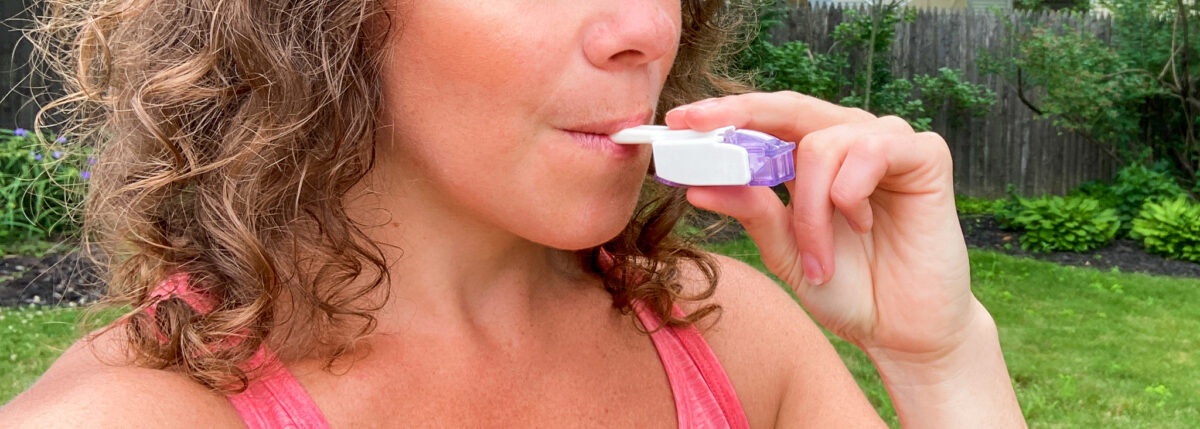How to Get Afrezza Inhaled Insulin — From Prescription To Coverage
Editor’s Note: Educational content related to inhaled insulin is made possible with support from MannKind (makers of Afrezza (human insulin) Inhalation Powder), an active partner at the time of publication. Editorial control rests solely on Beyond Type 1.
Please see full Prescribing Information and Medication Guide, including BOXED WARNING on Afrezza.com
Inhaled insulin—Afrezza manufactured by MannKind—is a unique kind of ultra-rapid-acting insulin for adults with type 1 and type 2 diabetes. FDA-approved in 2014, it’s still relatively new to the market, which means your doctor and health insurance provider may not be familiar with it.
Here’s what you need to know in order to get a prescription for Afrezza and have it approved by your insurance—or how to get it if you don’t have insurance coverage!
What is inhaled insulin?
- Afrezza (insulin human) Inhalation Powder is a man-made insulin that is breathed-in through your lungs and is used to control high blood sugar in adults with diabetes. Afrezza must be used with long-acting insulin in people who have type 1 diabetes. As with most medications, there are some people that should not use Afrezza, including anyone with long-term, chronic lung problems such as asthma or COPD.
- Afrezza is not recommended for people who smoke or have recently stopped smoking.
- Afrezza is not for use to treat diabetic ketoacidosis.
- It is not known if AFREZZA is safe and effective in children under 18 years of age.
Getting the prescription from your doctor
You may need to educate your healthcare team about Afrezza because it’s relatively new, and there are a few common misconceptions about using it. The top two misconceptions tend to be:
- Misconception #1: Afrezza is only for type 2 diabetes because of the 4, 8, and 12-unit dosing cartridges.
- Misconception #2: Afrezza isn’t safe for your lungs.
But those aren’t the facts! So, let’s get this straight:
- Fact #1: Afrezza can be used by adults with type 1 and type 2 diabetes for mealtime (bolus) and correction insulin doses. If you need background (basal) insulin via injection or pump, Afrezza cannot replace your background needs. The specific 4, 8, and 12-unit cartridges may sound overly simplified compared to traditional injectable therapy, but Afrezza has a variety of titration and combination boxes that allows for flexible dosing, which is something many Afrezza users appreciate.
- Fact #2: Afrezza is FDA-approved and has an established efficacy and safety profile. Before starting Afrezza®, your healthcare provider will give you a breathing test to check how your lungs are working.
Afrezza can be a good option for many people, so if your doctor is hesitant to write a prescription, you can educate your healthcare team to help them understand how Afrezza works and why you’d like to try it.
Note: If you struggle to speak up for yourself during your diabetes checkups, you’re not alone. Here is a resource that can help.
Follow these steps to get insurance approval for Afrezza.
How you fill your Afrezza prescription can play a big role in getting insurance to cover it.
If you have health insurance: Let your doctor know they should send the prescription to the pharmacy that Mannkind works closely with, UBC Pharmacy:
UBC Pharmacy
600 Emerson Road
Suite 300
Creve Coeur, MO 63141
NPI: 1962978858
Fax: 866-750-9260
Phone: 844-323-7399
Anyone in the United States can use this pharmacy to fill an Afrezza prescription.
- When your doctor sends the prescription to this pharmacy, the team of Afrezza patient support guides will work with your healthcare provider and insurance company to (hopefully) get approval. This process can take a few weeks or months. Be patient! In the end, 7 out of 10 people get Afrezza covered by their insurance company.
- In the meantime, Mannkind will actually have UBC Pharmacy send you a prescription of Afrezza to begin using while you wait for insurance approval.
- Your insurance company will need to hear reasons why your current insulins aren’t adequate. Afrezza’s patient support team and your healthcare team should work together to explain that your “current methods of diabetes management” aren’t working for you. If you’re denied coverage at first, appeal, appeal, appeal, and call Mannkind’s patient support representatives to help advocate for you.
- If you do get insurance approval, register for a co-pay savings card! This savings card brings the copay price down to $15 per prescription. Your insurance may approve a monthly supply or a 90-day supply.
The patient advocacy and overall customer service at Mannkind are fantastic. It’s easy to get a real human being on the phone very quickly! Use MannKind’s services and let them help you.
If you don’t have insurance or are denied coverage
If you are still denied coverage after trying all of this or if you don’t have health insurance, you still may be able to try Afrezza. Mannkind has a relatively affordable patient assistance program that offers people with diabetes the opportunity to use Afrezza for $99 per month.
Afrezza helps many people living with type 1 and type 2 diabetes who use it today. It’s worth the effort and the steps it takes to get your hands on it if you’re willing to try something new!
Important Safety Information
What is the most important information I should know about AFREZZA?
AFREZZA can cause serious side effects, including:
- Sudden lung problems (bronchospasms). Do not use AFREZZA if you have long-term (chronic) lung problems such as asthma or chronic obstructive pulmonary disease (COPD). Before starting AFREZZA, your healthcare provider will give you a breathing test to check how your lungs are working.
What is AFREZZA?
- AFREZZA is a man-made insulin that is breathed- in through your lungs (inhaled) and is used to control high blood sugar in adults with diabetes mellitus.
- AFREZZA is not for use in place of long-acting insulin. AFREZZA must be used with long-acting insulin in people who have type 1 diabetes mellitus.
- AFREZZA is not for use to treat diabetic ketoacidosis.
- It is not known if AFREZZA is safe and effective for use in people who smoke. AFREZZA is not for use in people who smoke or have recently stopped smoking (less than 6 months).
- It is not known if AFREZZA is safe and effective in children under 18 years of age.
What should I tell my healthcare provider before using AFREZZA?
Before using AFREZZA, tell your healthcare provider about all your medical conditions, including if you:
- Have lung problems such as asthma or COPD
- Have or have had lung cancer
- Are using any inhaled medications
- Smoke or have recently stopped smoking
- Have kidney or liver problems
- Are pregnant, planning to become pregnant, or are breastfeeding. AFREZZA may harm your unborn or breastfeeding baby.
Tell your healthcare provider about all the medicines you take, including prescription and over-the-counter medicines, vitamins or herbal supplements.
Before you start using AFREZZA, talk to your healthcare provider about low blood sugar and how to manage it.
What should I avoid while using AFREZZA?
While using AFREZZA do not:
- Drive or operate heavy machinery, until you know how AFREZZA affects you
- Drink alcohol or use over-the-counter medicines that contain alcohol
- Smoke
Do not use AFREZZA if you:
- Have chronic lung problems such as asthma or COPD
- Are allergic to regular human insulin or any of the ingredients in AFREZZA.
What are the possible side effects of AFREZZA?
AFREZZA may cause serious side effects that can lead to death, including:
See “What is the most important information I should know about AFREZZA?”
Low blood sugar (hypoglycemia). Signs and symptoms that may indicate low blood sugar include:
- Dizziness or light-headedness, sweating, confusion, headache, blurred vision, slurred speech, shakiness, fast heartbeat, anxiety, irritability or mood change, hunger.
Decreased lung function. Your healthcare provider should check how your lungs are working before you start using AFREZZA, 6 months after you start using it, and yearly after that.
Lung cancer. In studies of AFREZZA in people with diabetes, lung cancer occurred in a few more people who were taking AFREZZA than in people who were taking other diabetes medications. There were too few cases to know if lung cancer was related to AFREZZA. If you have lung cancer, you and your healthcare provider should decide if you should use AFREZZA.
Diabetic ketoacidosis. Talk to your healthcare provider if you have an illness. Your AFREZZA dose or how often you check your blood sugar may need to be changed.
Severe allergic reaction (whole body reaction). Get medical help right away if you have any of these signs or symptoms of a severe allergic reaction:
- A rash over your whole body, trouble breathing, a fast heartbeat, or sweating.
Low potassium in your blood (hypokalemia).
Heart failure. Taking certain diabetes pills called thiazolidinediones or “TZDs” with AFREZZA may cause heart failure in some people. This can happen even if you have never had heart failure or heart problems before. If you already have heart failure it may get worse while you take TZDs with AFREZZA. Your healthcare provider should monitor you closely while you are taking TZDs with AFREZZA. Tell your healthcare provider if you have any new or worse symptoms of heart failure including:
- Shortness of breath, swelling of your ankles or feet, sudden weight gain.
Get emergency medical help if you have:
- Trouble breathing, shortness of breath, fast heartbeat, swelling of your face, tongue, or throat, sweating, extreme drowsiness, dizziness, confusion.
The most common side effects of AFREZZA include:
- Low blood sugar (hypoglycemia), cough, sore throat
These are not all the possible side effects of AFREZZA. Call your doctor for medical advice about side effects.
Please see full Prescribing Information and Medication Guide, including BOXED WARNING on Afrezza.com.





